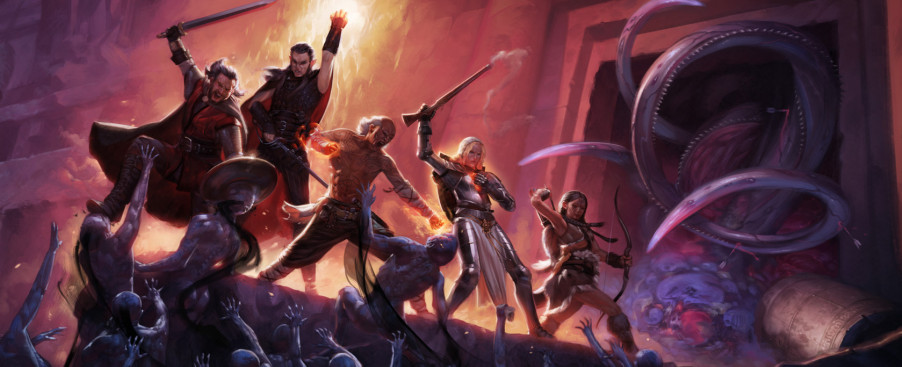Pillars of Eternity Interview
-
Category: InterviewsHits: 17745

Article Index
Buck: Why did you make the decision to remove item durability and degradation, despite these being planned for implementation in the beginning? Do you feel that having any type of item wear detracts from the game in a measurable way?
Josh: It wasn't actually planned for from the beginning, but when we developed the Crafting skill, there didn't seem to be much applicability for it from the perspective of an individual character. In a game where you're most likely to gain additional companions over the course of the game, it's very easy for you to find that you and a companion have redundant skills.
Redundancy is only a problem if the skill operates solely as a key for a variety of systemic locks. Traditional "Lockpicking" skills are the literal example of this. Only one person needs to open the door; everyone else can walk on through. If someone in the party is King Lockpick, another party member with 75% or 50% of the King's score may as well have 0% of the score. The bench-warming lockpicker gains nothing for their investment in the skill. We're trying to avoid this as much as possible.
For us, tying personal item degradation rate to the Crafting skill of the user solved two problems. First, it made Crafting valuable to any character who took it. Second, it provided a money sink in a style of game that typically does not have many.
I decided to remove the Crafting skill (not the system, just the skill itself) along with durability because many players didn't like the idea of durability in this game and/or didn't care about the economic implications (most of which would appear in the late game). Without the individual character benefit, the Crafting skill didn't meet the criteria for inclusion, so it was removed.
Does not having item degradation detract from the game in any measurable way? It's one fewer skill, but it was a skill that was tied to a system that still exists without it. It does mean player wealth will accumulate faster because that sink doesn't exist. But as I wrote above, mechanical additions that the player doesn't value over the course of the game should either be modified or removed.
And really, the bottom line is player enjoyment. Challenge is part of enjoyment and even routine activities like item repair can be part of enjoyment. In series like S.T.A.L.K.E.R. or Fallout, it can be part of what's enjoyable because it fits the setting. Systemic item degradation and repair mechanics have never been part of the IE games (and are only rarely used in any edition of A/D&D) so they feel less appropriate.
Buck: Can you please elaborate on some of the game's non-combat skills such as Mechanic and Survival, their importance in the game, and how often we'll be using them? Will all of these skills be equally as valuable, and will they complement combat skills in any measurable way?
Josh: Mechanics can be used to find and disable traps as well as to open locks. For individual characters, it determines the power of traps that the character sets. Only one trap per-character can be active at a time, so even if you have a party of rogues who all have maxed-out Mechanics, it's valuable.
Survival is used to determine how long the effects of consumable foods, drinks (including potions), and drugs last. Their durations are modified based on the user's Survival, so individual characters can derive a lot of benefit from investment in it.
Additionally, Mechanics and Survival can be used in scripted interactions and, less commonly, in conversations. Those uses are not systemic, but depend on the circumstances of the interaction.
As with most of our character build options, we want to make all choices valuable to the player, so even in scripted interactions we want to make regular use of each skill.
Buck: A deliberate focus on thieving abilities, particularly the ability to find secret doors, has been considerably lacking in a vast majority of role-playing games in recent memory. How will Pillars of Eternity handle secret doors, traps, lockpicking, thieving, disguises, and other roguish elements?
Josh: We use a combined searching/sneaking state called Scouting Mode. When you activate it, characters slow to a walk and your Stealth and Mechanics skills turn on -- the former to hide, the latter to find hidden objects.
Unlike the Infinity Engine games, searching is not on a 6 second timer, but it is possible to overrun a trap if you aren't careful. The higher a character's Mechanics skill is, the farther away from the object (trap, door, etc.) he or she can be before detecting it.
Detecting a trap is no guarantee that the character can disable it. If no one in the party has the required skill, the trap is still visible, but you will either have to set it off or find some way around it.
Lockpicking is also handled by the Mechanics skill. Pickpocketing/sleight-of-hand instances are special cases. They are covered by the Dexterity attribute (not skill) in conversations and scripted interactions.
As a side note, no class has restrictions on what skills they can purchase. Rogues get a free bonus to both the Mechanics and Stealth skills, but all classes can buy them.

